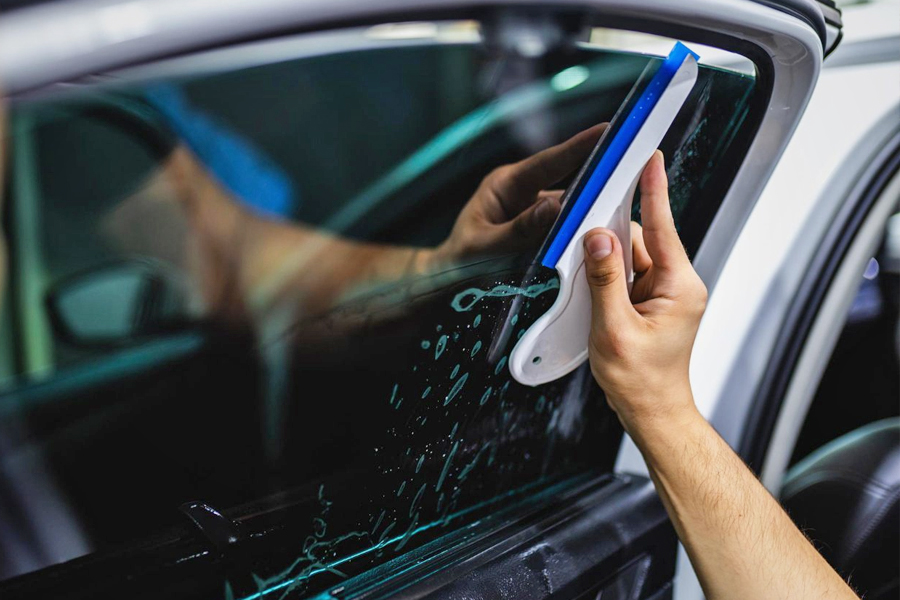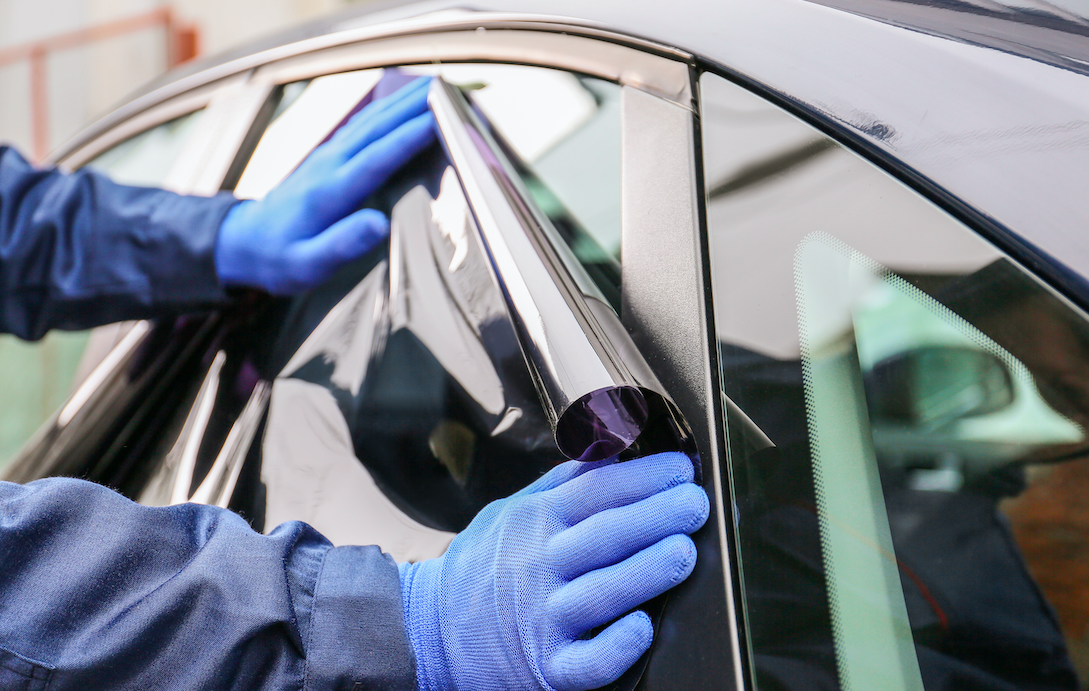A Comprehensive Overview to Solutions Used With Window Color Solutions
Window tinting has become a crucial solution for both household and business settings. It provides various films created to satisfy details requirements, such as warmth reduction and personal privacy enhancement. Comprehending the series of choices offered is essential for making informed decisions. This overview will discover the different types of window tinting movies, their advantages, and the installment process. It will likewise address legal considerations that might impact your selections. What variables should one take into consideration before proceeding?
Sorts Of Window Tinting Films
Home window tinting movies come in numerous types, each designed to satisfy particular demands and choices. One of the most usual types include dyed, metalized, ceramic, and crossbreed movies. Colored movies offer a fundamental degree of personal privacy and warmth reduction, using a color layer to take in warmth. Metalized films integrate small metal fragments, supplying improved warm denial and glare reduction while additionally adding sturdiness. Ceramic movies stand apart for their superior efficiency, as they obstruct warmth without disrupting signal transmission, making them perfect for electronic gadgets. Lastly, crossbreed movies incorporate components of both colored and metalized films, giving an equilibrium between visual charm and practical advantages. Each film type differs concerning light transmission, UV security, and guarantee choices, permitting consumers to choose a solution that aligns with their particular requirements and design preferences. Comprehending these options is vital for making an educated choice when thinking about home window tinting services.
Benefits of Residential Window Tinting
Residential window tinting offers a range of benefits that boost both comfort and energy performance in homes. Among the main advantages is the decrease of heat gain, which brings about lower energy bills by minimizing the reliance on cooling systems. In addition, window tinting aids to obstruct dangerous UV rays, protecting both residents and home furnishings from sunlight damage and fading.Moreover, it improves personal privacy without jeopardizing natural light, permitting house owners to appreciate their views while keeping spying eyes at bay. The application of window movie likewise boosts safety and security by holding destroyed glass in position throughout tornados or crashes, therefore lowering injury risks.Furthermore, residential window tinting can contribute to an extra cosmetically pleasing exterior, as various movie choices are offered to match different architectural designs. Overall, these advantages make window tinting a beneficial and sensible investment for house owners looking for boosted livability and power performance.
Benefits of Industrial Home Window Tinting
While lots of organizations look for methods to boost their job environment, industrial window tinting provides a wide variety of advantages that can significantly enhance both staff member comfort and functional performance. One primary advantage is the decrease of glare, which can substantially boost productivity by permitting staff members to work without distractions from harsh sunlight. Furthermore, window tinting can aid regulate indoor temperature levels, resulting in lowered dependence on cooling and reduced energy costs.Furthermore, tinted home windows use UV defense, protecting staff members and furnishings from unsafe rays that can create skin damage and discolor materials. This security not only contributes to a much healthier workplace yet likewise lengthens the life of office interiors. Inevitably, business home window tinting can improve personal privacy, enabling organizations to maintain a specialist appearance while decreasing outside disturbances. Overall, these advantages make commercial window tinting an important investment for services intending to optimize their work area.
The Window Tint Setup Refine
A successful home window tint installment process involves a number of key actions to assure excellent results. At first, the area and home windows should be extensively cleaned to get rid of dirt, grease, and any kind of other impurities that could affect adhesion. Next off, the tint film is thoroughly measured and reduced to fit the particular measurements of each window.Following this, the installer uses a remedy to the glass surface to enable repositioning of the movie prior to it sticks. The movie is after that placed onto the window, making certain it is free of bubbles and creases. Once positioned properly, a squeegee is utilized to eliminate excess water and air.Finally, the edges of the film are cut for a neat surface, and the installation is examined for high quality. Appropriate attention to these actions ensures the longevity and efficiency of the window tint, enhancing both aesthetic appeals and performance.
Maintenance and Take Care Of Your Window Tint
Just how can one guarantee the durability and look of home window tint? Proper upkeep and treatment are crucial. It is suggested to wait at least 30 days after installment prior to cleaning the tint to allow for correct attachment. When this period mores than, utilizing a soft fabric or microfiber towel can stop scrapes while cleansing. Gentle, ammonia-free cleansers should be used to stay clear of damaging the film.Regular evaluations of the edges and surface area can aid determine any kind of bubbling or peeling off early, allowing for timely fixings. Avoid using rough materials or rough chemicals that might break down the color. Furthermore, auto parking in shaded locations or utilizing sunshades can reduce UV exposure, further safeguarding the color's honesty.
Legal Factors To Consider for Window Tinting
Lawful factors to consider for home window tinting vary substantially throughout various states. Each state has specific policies pertaining to noticeable light transmission restrictions, which dictate exactly how much light can go through colored home windows. Furthermore, some states use clinical exceptions, permitting people with certain problems to utilize darker tints than normally allowed.
Tinting Regulations by State
While home window tinting can boost a vehicle's visual appeals and give extra privacy, it is crucial for lorry proprietors to recognize the varying laws that control tinting across various states. Each state has its very own details legislations concerning the permissible levels of color darkness, reflection, and the kinds of home windows that can be tinted. For example, some states enable darker colors on back windows yet enforce stricter limits on front side home windows. In addition, specific states may call for certain labels or certificates to verify compliance. Stopping working to abide by these policies can cause fines or the requirement to remove the tint (Davinci of Michigan Window Tinting). Vehicle owners must research their state's legislations prior to spending in home window tinting services.
Noticeable Light Transmission Boundaries
Understanding the visible light transmission (VLT) limitations is crucial for anybody thinking about home window tinting. VLT refers to the percent of noticeable light that can pass with the colored glass. Various states have varying policies concerning appropriate VLT degrees, especially for different windows in automobiles. Front windscreens commonly have stricter limits compared to side and rear windows. Going against these laws can result in fines and the demand to eliminate non-compliant tinting. As an outcome, it is crucial for people to research their state's specific VLT regulations before waging home window tint installation. Compliance assurances not just legal adherence but likewise security and exposure while driving, advertising a safer atmosphere for all roadway customers.
Medical Exceptions for Tinting

Picking the Right Window Tinting Service
Selecting the right home window tinting service includes a cautious assessment of specific tinting requirements. It is crucial to examine various service options, ensuring they straighten with the desired outcomes. Additionally, understanding the legal regulations governing home window tinting can help prevent prospective issues down the line.
Analyzing Tinting Requirements

Reviewing Service Options

Comprehending Legal Laws
Before choosing a window tinting service, individuals need to recognize the legal regulations regulating tinting in their area, as these regulations can vary considerably between municipalities and states. Each territory might impose details limitations on the allowable tint darkness, reflective properties, and which home windows can be tinted. For instance, some states may permit darker colors on rear home windows while forbiding them on front home windows. Additionally, regulations commonly outline the types of materials that can be made use of and may need specific labeling or accreditation. Failure to adhere to these laws can cause penalties or the need to eliminate the color. Subsequently, prospective consumers should verify the validity of their preferred tint and consult professionals acquainted with neighborhood regulations to guarantee conformity.
Often Asked Concerns
For How Long Does Window Tinting Commonly Last?
The longevity of home window tinting typically varies from 5 to 10 years, depending upon variables such as the quality of the movie, installment procedure, and ecological conditions. Regular maintenance can additionally influence its life expectancy significantly.
Can Window Tinting Be Eliminated Easily?
The simplicity of home window color removal depends on the installation approach and glue utilized. Typically, expert services assure safer, cleaner elimination, while DIY efforts might lead to damage to the glass or sticky residue.
Will Window Tinting Influence My Home's Resale Value?
Window tinting can influence a home's resale value favorably or negatively. Possible purchasers might value energy savings and privacy, while others could view it as an individual preference, impacting general charm and desirability of the property.
Are There Eco-Friendly Window Tinting Options Available?
The inquiry regarding green home window tinting alternatives reveals that numerous suppliers currently provide items utilizing sustainable materials. These options can reduce power intake and improve convenience while aligning with ecologically mindful practices in home improvement.
Can Home Window Tinting Assist With Energy Effectiveness?
Window tinting can significantly improve energy efficiency by decreasing warmth gain and loss. This aids maintain comfortable interior temperatures, possibly decreasing cooling and heating expenses, while also adding to a more sustainable atmosphere through minimized energy intake. The application of window film likewise enhances safety by holding shattered glass in place during tornados or accidents, thus reducing injury risks.Furthermore, domestic window tinting can add to a more cosmetically pleasing outside, as numerous film alternatives are available to match different building designs. Additionally, home window tinting can help manage indoor temperature levels, leading to reduced dependence on air conditioning and reduced power costs.Furthermore, tinted windows provide UV protection, shielding workers and home furnishings from dangerous rays that can Learn More cause skin damages and discolor materials. Some states permit darker tints on rear windows yet enforce more stringent restrictions on front side home windows. Prior to picking a home window tinting solution, individuals need to recognize the lawful laws controling tinting in their area, as these regulations can differ considerably between states and towns. Some states great site might allow darker tints on back windows while banning them on front windows.